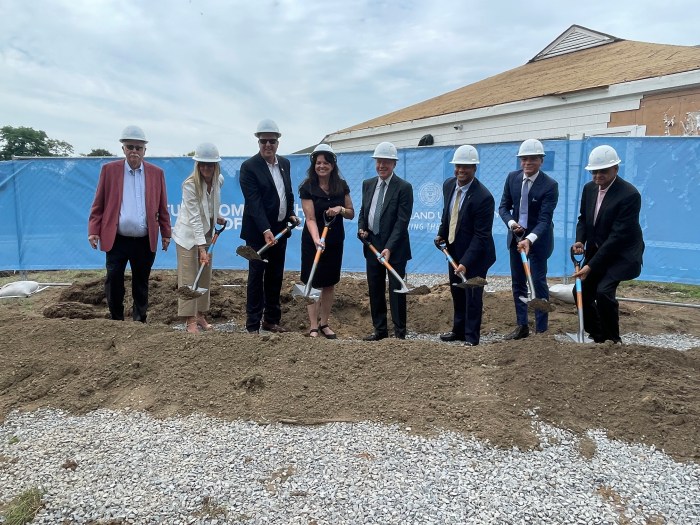A capacity crowd attended the screening of Ocean Frontiers II at Jack Halyard’s on Thursday, Jan. 30.
Paul DeOrsay of Friends of the Bay said it best when he said, “The tremendous turnout we saw this evening shows that our community is genuinely concerned for the welfare of Oyster Bay, the Sound, and the world ocean, and eager to learn what can and is being done to ensure its future health. The first step toward effective action is an informed populace and the will to act.”
The Ocean Frontiers documentaries concern the partnerships that are coming together to protect the world’s oceans, in recognition that the ocean is facing challenges, such as overfishing and pollution, as never before, and that new solutions have to be found to protect it. Ocean Frontiers II described the steps taken in planning the siting of the Block Island Wind Energy Project off the shores of Rhode Island.
The documentary explained the process of planning the project, and the different stakeholders involved in the process. In the planning process, consideration has to be given to the history of the place, the environment, and what historic sites may have been there. In the case of the Block Island Wind Energy Project, this included groups as diverse as the US Navy, commercial fishermen, shipping companies, and the states whose coastal waters would be impacted by the development. The spokesman for the Block Island project said that it is in everyone’s interest to work out an equitable solution. There are difficult decisions to be made, involving federal, state, and municipal officials as well as fishermen, shippers, and environmental organizations, all of whom want say in the ocean’s well being.
Spokesmen for the diverse groups involved noted their concerns about the impact of the project and how their organizations participated in the process. For example, the project is in an area of critical habitat for North Atlantic Right Whales. There are less than 400 of these whales left in the world. The pile driving equipment could impact these whales during the time period they are migrating through the area, so the decision was made not to do any pile driving in April. One notable exception was any discussion of impacts on migratory birds, which would be a major concern for this project, as is it located in the Atlantic Flyway. It seemed to be a glaring omission, and raised the question as to whether groups such as the Audubon Society had been involved in the process, and what might have been done to address those concerns.
The four hosts of the evening, Friends of the Bay, The WaterFront Center, Oakcliff Sailing Center and Jack Halyard’s are all working to protect and preserve the local waters, each in their own way. Friends of the Bay is well-known for its water quality monitoring and advocacy efforts for Oyster Bay and Cold Spring Harbor. The WaterFront Center provides education. They are eagerly looking forward to their new programs and the 2014 season.
Cameron Jenness, education director at the WaterFront Center, gave an example of successful program the center conducted with Cornell this past summer. Students at the center tagged horseshoe crabs and conducted a survey of the population. It seems that the area from Beekman Beach to Theodore Roosevelt Park has more crabs than anywhere else on the North Shore.
Dawn Riley of Oakcliff protects the waters by not using copper in the bottom paint of the boats in the Oakcliff fleet, only cleaning the bottoms when they absolutely have to, which reduces the amount of paint going into the water. Oakcliff does not use plastic, single use water bottles; the center asks sailors to bring their own reusable bottles, and they don’t provide box lunches. She says this has reduced the trash by a dumpster a week. The sailing center also uses real plates and utensils when possible. When disposables have to be used, they use compostable plates, silverware and cups. If only all the clubs and regattas would do this it would have a tremendous positive impact on our waters.
Ocean Frontiers I will be screened on March 6, at 7 p.m. at Jack Halyard’s. Judging by the success of the first screening, it is advised to get there early. As Paul DeOrsay said, “All of us who hosted are excited by the success of this pilot program and looking forward to doing it again. We are discussing ways to accommodate more people comfortably, and to provide a more structured question and discussion opportunity for those who are interested. There was a lot of knowledge in that room, and I think we all would have liked to learn more.”


































